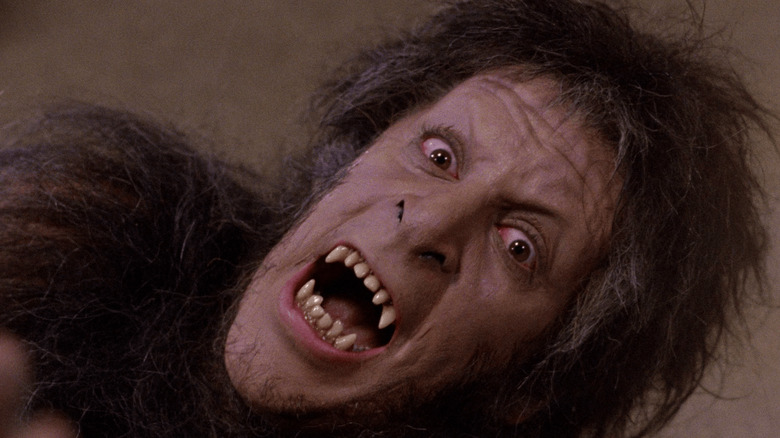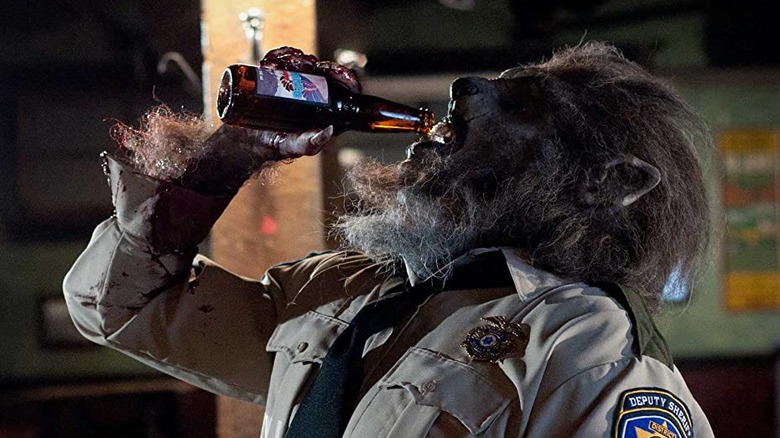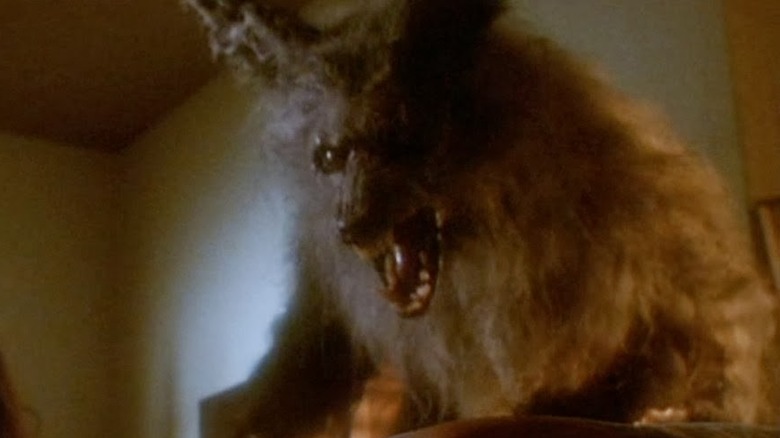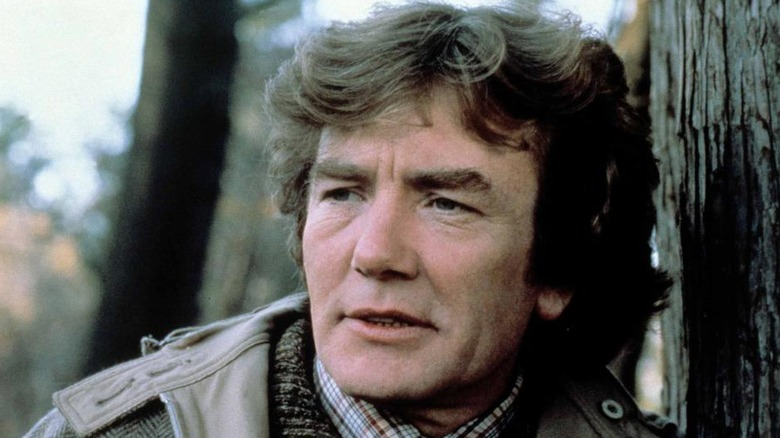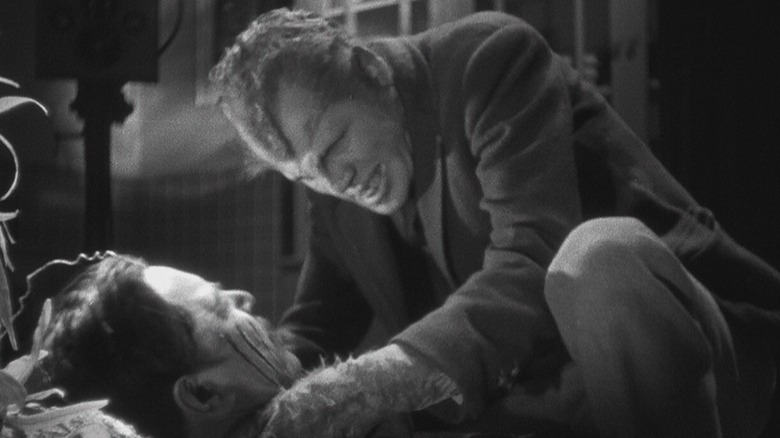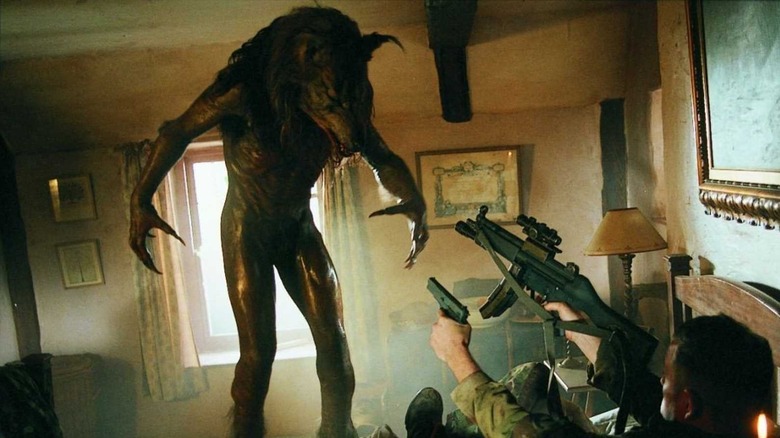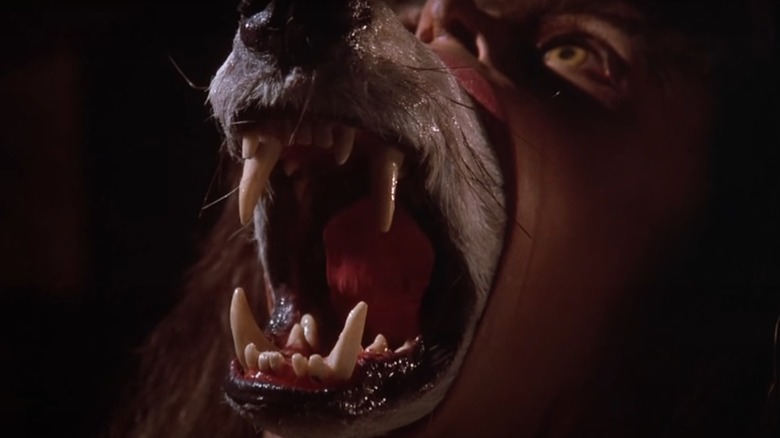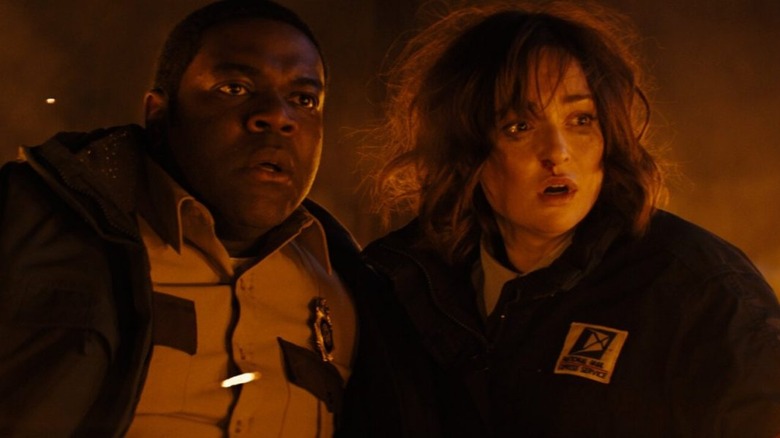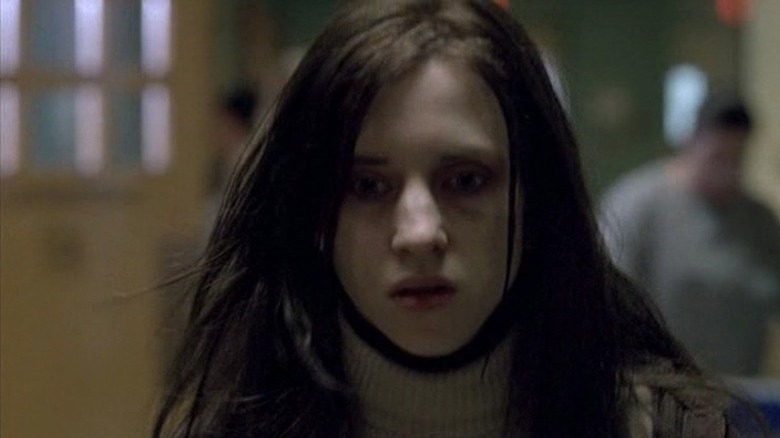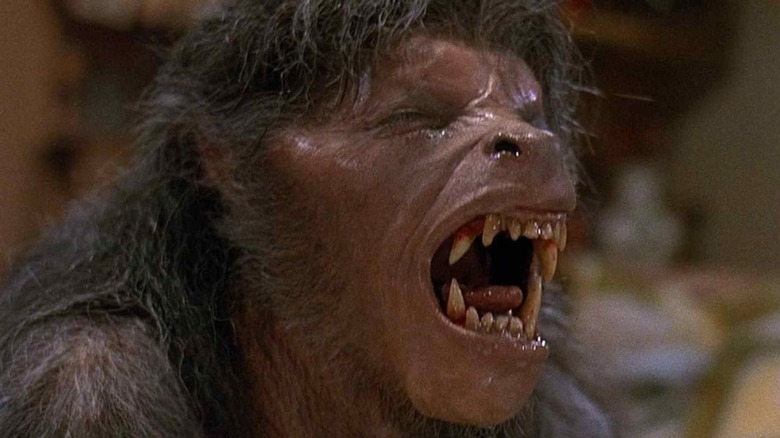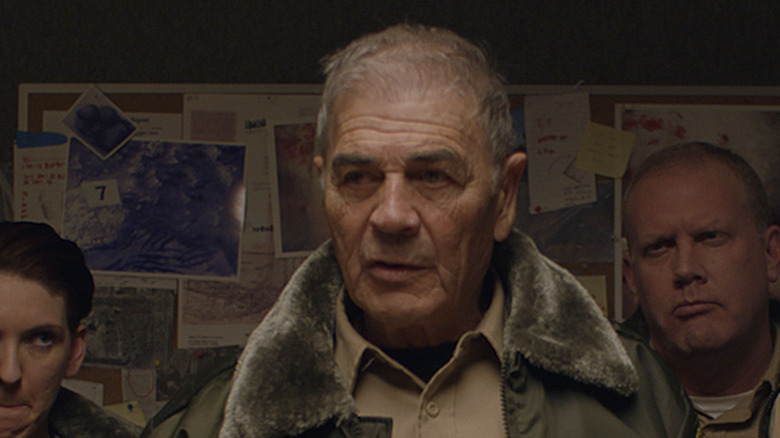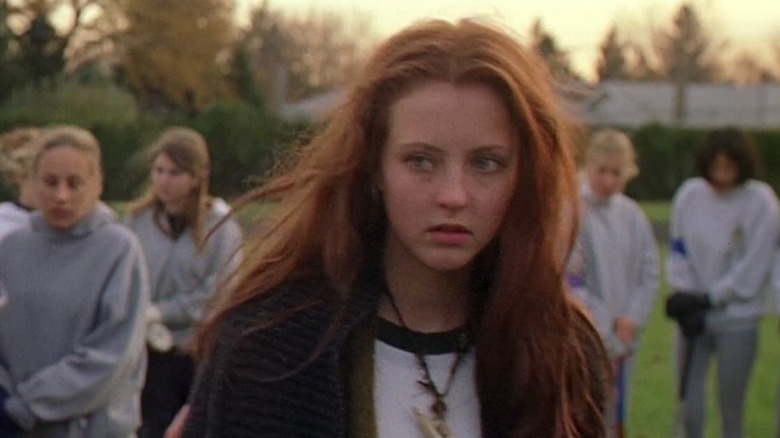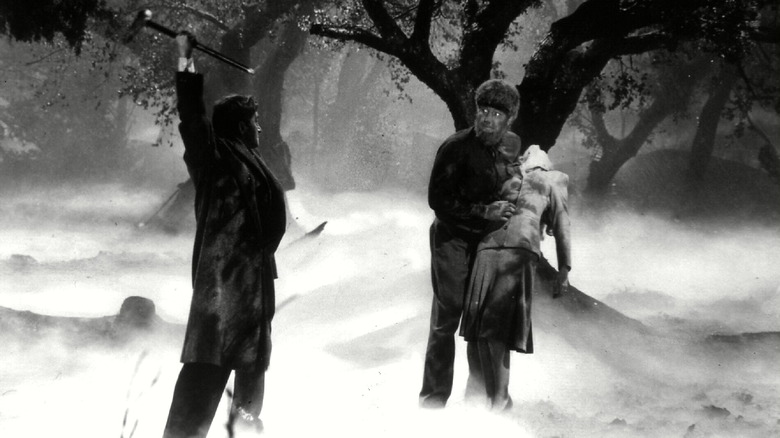The Best Werewolf Movies Ranked
Werewolves have long been part of our human cultural lexicon on an international scale. The Ancient Greeks told tales of the Arcadian king Lycaon who was once turned into a wolf by an angry Zeus. In the Norse Saga of the Volsungs, Sigmund and Sinfjotli wore wolf skins that they couldn't remove which turned them into werewolves. Blackfoot mythology has a tale of a man turned into a "man-wolf" hybrid. These longstanding global images of a wolf-man hybrid became early cinema legend, first and foremost in the 1913 silent film "The Werewolf" (a film now considered lost). Werewolf horror has been present in the earliest years of cinema until even the contemporary era.
Werewolf cinema boasts early classics like 1935's "Werewolf of London" and 1941's "The Wolf Man" to contemporary successes like 2021's "Werewolves Within." It spans subgenres from horror-comedy in "An American Werewolf in London" to the high-octane action-horror of "Dog Soldiers" to the whodunit-werewolf hybrid of "The Beast Must Die." Covering the whole of film history, here is a list of the best werewolf movies in cinema history. Each of these excellent films will build your love of lycanthropy and your wonder over the werewolf.
12. Wolfcop (2014)
In 2014's "Wolfcop," Lou Garou (Leo Fafard) is an alcoholic cop in a small town of Woodhaven. Willie Higgins (Jonathan Cherry) places a call about suspicious occult activity, sending Lou to investigate. He finds occult activity, of course, before being ambushed and knocked out. Higgins wakes with no memory of what happened ... but he now has a pentagram carved into his chest. He beings a gradual transformation, eventually becoming the beast. Lou soon discovers he was the victim off a ritual intended to use a werewolf to strengthen the magic of shapeshifting reptilian aliens.
If that sounds like a hodgepodge of ideas, it is. The film is a horror-comedy send-up of genre film. At the same time, the film is imaginative and funny with a thorough knowledge of the genres it's satirizing. Boasting a 65% Certified Fresh rating on review aggregator site Rotten Tomatoes, "Wolfcop" definitely leans more on the comedy side of horror-comedies but it's absolutely an engaging (if bonkers) entry in the annals of werewolf film history. Perhaps most importantly, the werewolf costume is good! What more does anyone need?
11. The Howling (1981)
Serial murderer Eddie Quist is on the loose in Los Angeles. He stalks journalist Karen White, who aids the police in their attempt to solve the crime. She's found and briefly tormented by Eddie after the police use her as bait, and he's shot. The ordeal begins to take a psychological toll on Karen. She tries to get away from it all and attends Dr. George Waggner's isolated retreat "The Colony" with her husband Bill in hopes to get well. We gradually come to understand that The Colony is neither safe nor werewolf-free and Karen is more in danger than ever.
"The Howling" is quite an amusing werewolf horror-comedy. Director Joe Dante ably manages to balance scares and laughs as the situation gets perpetually larger, spiraling out of control. The makeup special effects are also top-tier, constructed by makeup maestro Rob Bottin (who notably also worked on classics like "The Thing," "Total Recall," "Se7en," and "Fight Club"). It's easily a must-see classic that stands out among 1980s werewolf films.
10. Wolfen (1981)
Michael Wadleigh's "Wolfen" is an intriguing werewolf horror-noir hybrid, focusing on New York City police investigator Dewey Wilson (Albert Finney).The city is plagued by a slew of mutilations that appear to be done by a wild animal. He teams with criminologist Rebecca Neff (Diane Venora) and the pair investigate. Wilson eventually makes his way to an old acquaintance, the Native American former activist Eddie Holt (Edward James Olmos). Holt points the pair both towards the true supernatural cause of the attacks and to his own shapeshifting abilities. They discover that werewolf clans have been killing to protect their hunting grounds within the city, and that there may be little humanity can do about it.
"Wolfen" is an intriguing horror-noir film (and a rare example of that hybrid genre altogether), with a complex mythos, solid worldbuilding, strong performances from Finney and Olmos, and smart direction. Finney himself truly shines, and the film takes some unique directions among other entries in the cinematic werewolf canon.
9. Werewolf of London (1935)
1935's "Werewolf of London" isn't the werewolf film we typically associate with the classic Universal Monsters, but it's a distinguished member of the series nonetheless and the by some accounts the first mainstream, feature length Hollywood film to feature a werewolf. Wilfred Glendon (Henry Hull) is an English botanist who travels to Tibet in search of a rare plant before being bitten by a werewolf. Glendon is gradually overcome by the lycanthropy and driven to kill, with the one temporary antidote (said rare plant) in short supply. It's bad news for a man losing control of his transformations and animalistic bloodlust, setting up a tragic end.
In addition to being the first major werewolf film, the film boasts werewolf make-up from the legendary Jack Pierce (who went on to do more complex werewolf make-up for "The Wolf Man" six years later). The film is referenced in titles like 1981's "An American Werewolf in London", the 1978 Warren Zevon track "Werewolves of London," and it's a solid edition in the pantheon of werewolf movies.
8. Dog Soldiers (2002)
Neil Marshall's excellent "Dog Soldiers" follows a small squad of British soldiers on a training mission in the Scottish Highlands. Their goal is to find a special ops unit, but they discover a single survivor of a vicious massacre. The group that attacked the special ops team proceeds to regroup and attack the squad before the latter are saved by zoologist Megan (Emma Cleasby), who explains the true nature of their foes: they're werewolves. The isolated unit have to survive the night until the full moon disappears.
As far as werewolf horror cinema goes, "Dog Soldiers" is a high octane thrill ride and a frightening film to boot. It has great action and choreography, talented direction, and strong performances from a cast you see all over now — alongside a great and novel werewolf design. These werewolves are purely inhuman, upright-standing humanoids beasts, sleek and muscular and dangerous. The simple premise — survive the night versus a vicious coordinated werewolf attack – allows the film to feel like a tense, focused exercise in intense terror. A definite must-see.
7. The Company of Wolves (1985)
Neil Jordan's 1984 fantasy horror film "The Company of Wolves" is a stunning take on the Little Red Riding Hood mythos. Young Rosaleen goes to stay with her grandmother and is given a red shawl to wear. The grandmother speaks of an ominous prophecy, "don't stray from the path, never eat a windfall apple, and never trust a man whose eyebrows meet." Her village is under siege by a mysterious wolf who has been attacking the cattle. There's modern-day frame story that makes it more complex, and the supernatural menace looms large.
The film is co-written by Jordan and Angela Carter from Carter's own story, and it's an interesting film with a multi-layered narrative, a strong fantasy feel, and a stunning ending. As far as 1980's werewolf films go, films like "An American Werewolf in London" and "The Howling" rightfully get mentioned a lot as important films in the lycanthrope canon — but "The Company of Wolves" is has excellently developed fairytale elements, and shouldn't be forgotten as a truly great film.
6. Werewolves Within (2021)
While whodunits have been popular throughout film history, werewolf whodunits are few and far between. One worth mentioning is 2021's "Werewolves Within." This Josh Ruben-written-and-directed flick is based on the Ubisoft VR game "Werewolves Within," and stars Sam Richardson as new forest ranger Finn. Finn arrives at a small town Beaverfield when a storm forces him, the townsfolk, and mail carrier Cecily Moore to pile into a local lodge while the town is under blackout. With everyone corralled, evidence mounts that a werewolf may be on the loose. The group have to figure out if that's true and how to discover the culprit in a wonderful horror-comedy.
The film is charming from first frame to last, loaded with twists and turns, and the lead performances by Richardson and Vayntrub are exceptional. It's a tightly written, ably directed, fun werewolf film with some great kills, and its snowy atmosphere is perfect for a winter's day. It's a definite modern classic that's even been hailed by some as the greatest film based on a video game of all time.
5. Ginger Snaps 2: Unleashed (2004)
The original "Ginger Snaps" sees the bond of two sisters, Brigitte and Ginger, broken when the later is turned into a werewolf. The film is followed by two subsequent projects filmed back-to-back: the sequel "Ginger Snaps 2: Unleashed" and the far-in-the-past prequel "Ginger Snaps Back: The Beginning." The sequel sees Brigitte attempt to use the herb monkshood to cure her lycanthropy, but it's found to be impossible — the best that can be done is to slow down the transformations. As she increasingly becomes subject to thoughts of sex and murder, she eventually finds herself in a clinic where she meets Ghost. All the while she's followed by a male werewolf. She finds herself beset on all sides — the werewolf increasingly threatens her and her community, while Ghost manipulates her through feigned friendship with plans on using Brigette's condition as a weapon.
While "Ginger Snaps" is a classic that highlights a changing relationship between once-close sisters alongside growing puberty pains, "Ginger Snaps 2" is focused on one's relationship to one's own changing self and issues of betrayal and human villainy. Emily Perkins delivers an excellent performance once again as Brigitte, easily carrying a film that's both tense and smartly written. It's certainly a different film than its predecessor but an exceptional one nonetheless.
4. An American Werewolf in London (1981)
John Landis' "An American Werewolf in London" follows two college students, David (David Naughton) and Jack (Griffin Dunne), as they backpack through Britain. They find themselves attacked by a large wolf-like creature. Jack doesn't survive as David heals — and is plagued by nightmarish visions of Jack, who warns him he's becoming a werewolf. David wrestles with thoughts of ending it all before he transforms fully and loses all control, with an ending that really wows.
In addition to being recognized as a top-tier werewolf film, "An American Werewolf in London" is also often acknowledged as one of the greatest horror comedies of all time. The film also boasts one of cinema's most dramatic and terrifying transformation scenes, as well as exceptional makeup by iconic creature creator and makeup artist Rick Baker (who won his first Academy Award for his work on the film). The film is ultimately one of the best and most memorable werewolf films in history.
3. The Wolf of Snow Hollow (2020)
Jim Cummings' "The Wolf of Snow Hollow" follows alcoholic police officer John Marshall (Cummings) as he's called in to investigate a vicious murder of two tourists in the town of Snow Hollow, Utah. These small town police become shocked by the brutality and the increasing wave of murders in this once peaceful town. When locals start to whisper about the appearance of a werewolf-type beast, the rumor mill begins to terrify the town as they prod the police to stop the carnage.
"The Wolf of Snow Hollow" has a strong sense of place and tone, great performances, some novel twists that really land, and its really a lot of fun. It's also worth noting that the film marks the final performance of the excellent Robert Forster, and his layered portrayal of John's father Sheriff Hadley (the film is dedicated to him). If you haven't seen it, it's easily worth a watch.
2. Ginger Snaps (2000)
"Ginger Snaps" follows sisters Ginger (Katherine Isabelle) and Bridgette (Emily Perkins) who are fascinated with the morbid and who make a death pact: move away together or die by 16. The area in which they live is plagued by a series of violently killed animal corpses. One day Ginger has her first period while the sisters are out getting revenge on a bully. The blood draws the attention of the beast that's been attacking and the pair get attacked with Ginger is wounded. You can probably guess which supernatural beast what did it and what happens.
Many films and TV entries had used lycanthropy as a metaphor for puberty but often for boys ("I Was A Teenage Werewolf" or "Teen Wolf," anyone?), but "Ginger Snaps" is easily the best of them. The performances land, the story works, the use of the metaphor for girls' puberty is symbolically strong, the werewolves are cool, and pretty much all of it is an incredible example of a horror film being successfully layered with meaning.
1. The Wolf Man (1941)
1941's "The Wolf Man" is Universal's second foray into lycanthrope cinema following 1935's "Werewolf of London." "The Wolf Man" stars Lon Chaney Jr. as Larry Talbot, returning to his family in Wales due to his brother's unfortunate death. He falls in love with the local antique shop owner Gwen Conliffe (Evelyn Ankers) and later saves her friend from a werewolf attack. Tragically, the attack infects him with lycanthropy, setting up a chain of events that sees Larry transform into a werewolf and kill villagers under the spell of his condition. He doesn't initially remember the events, but the memories gradually return and haunt him. Despite the character's evident death in the end, Lon Chaney Jr. played the popular Wolf Man in four sequels.
"The Wolf Man" boasts a great performance by Lon Chaney Jr. (incidentally, the Wolf Man character is the only Universal monster to be played by the same actor throughout the 1940s, a fact Chaney Jr. was proud of). It also has amazing make-up by the legendary Jack Pierce and the film greatly influenced subsequent werewolf lore in popular culture. It's the cinematic foundation of the majority of werewolf films that followed, and a classic in its own right.
